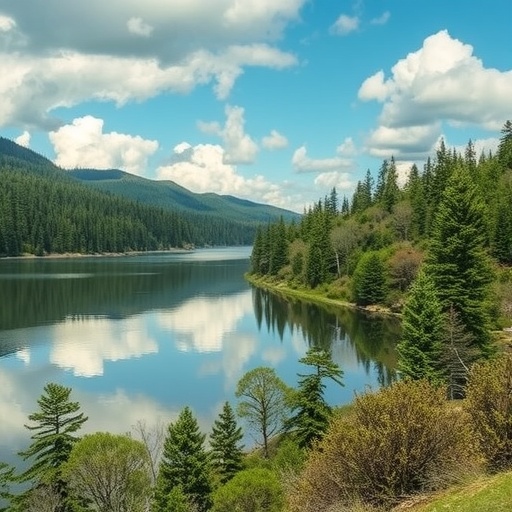In a groundbreaking study published in Commun Earth Environ, researchers have identified a significant disparity in the intensity of heatwaves experienced by lakes compared to the atmosphere. This study, led by Yang Y. and collaborators, reveals that lakes are not just passive recipients of climatic changes, but instead are becoming frontline indicators of escalating environmental stress. The findings bring to light critical insights about freshwater ecosystems and their increasing vulnerability to climate change.
The researchers utilized a comprehensive dataset, analyzing heatwave data from over a hundred lakes across various continents. By employing advanced statistical models, the team aimed to compare the intensity and duration of heatwaves impacting these lakes to those in the surrounding atmosphere. Their analysis painted a startling picture: lakes are suffering from heatwaves that are significantly more intense than those affecting the air above them. This phenomenon could have dire implications for aquatic life, as elevated water temperatures can disrupt ecosystems, harm fish populations, and even lead to toxic algal blooms.
The team was particularly surprised by the magnitude of the differences observed. While atmospheric heatwaves had been acknowledged as frequently severe, only recently have scientists begun to draw attention to lake heatwaves. Elevated water temperatures can lead to reduced dissolved oxygen levels, directly impacting fish and other aquatic organisms. Additionally, the study highlights that heatwaves are occurring with increased frequency, amplifying the stress on these fragile aquatic ecosystems.
Furthermore, the research underscores the role of lakes as indicators of climate change. They tend to absorb heat more rapidly than the atmosphere, leading to quicker responses to rising temperatures. This makes lakes an important focus for climate research, as changes in lake temperature can provide vital insights into broader climatic trends and shifts. The authors emphasize that understanding these dynamics is crucial for developing adaptive strategies to mitigate the impact of climate change on freshwater resources.
Heatwaves in lakes are not just about elevated temperatures; they involve complex interactions between various environmental factors. For instance, the surrounding landscape, local climate variations, and human activities all play a role in determining how lakes respond to heat. The research highlights the nuances of these interactions, showing that seemingly minor changes in the environment can magnify the effects of heatwaves on these bodies of water. Therefore, the study advocates for a multifaceted approach to understanding and mitigating these impacts.
The implications of this research extend beyond ecological consequences. As freshwater sources become increasingly stressed, communities relying on these resources may face significant challenges. Fisheries, which form a critical source of livelihood and food for millions, could suffer as fish populations decline due to rising temperatures and habitat degradation. Moreover, the health of waterborne recreational activities, along with tourism around lakes, could be adversely affected. This raises important questions about sustainable management practices and policies needed to protect these essential freshwater ecosystems.
This study also calls for greater awareness among policymakers and the general public regarding the fragile state of lake ecosystems. Many may not realize that the seemingly tranquil surface of a lake can mask profound stressors beneath. By focusing attention on the hidden dynamics of lake heatwaves, the researchers hope to spur action aimed at conserving freshwater resources and implementing measures to mitigate climate change impacts.
Detection of lake heatwaves is also critical for predicting further environmental changes. The warming of lakes can lead to altered mixing patterns, potentially affecting nutrient availability in the water. This could not only influence the productivity of aquatic ecosystems but also disrupt the entire food web. Researchers underscore that regular monitoring and predictive modeling of lake temperatures should be prioritized to identify trends and potential threats early on.
As lakes begin to exceed certain thermal thresholds, the ecological balance within these ecosystems may shift irreversibly. This can potentially lead to a scenario where fish species that are sensitive to heat may decline, while heat-tolerant species proliferate. Such shifts could destabilize existing fish communities, emphasizing the importance of adaptive management strategies for wildlife conservation in response to these changes.
Given the findings, there is an urgent need to integrate this knowledge into climate adaptation strategies. Conservationists and environmental managers must consider lake heatwaves as part of broader climate modeling efforts. This includes understanding how watershed management and land-use planning could impact lake ecosystems. Innovative approaches such as creating buffer zones around lakes, restoring wetlands, and improving urban planning near water bodies could be beneficial.
In conclusion, the revelation that lakes are experiencing more severe heatwaves than the atmosphere not only sheds light on the vulnerabilities of these ecosystems but also serves as a clarion call for action. Researchers believe that increased awareness, alongside integrated management strategies, can help safeguard these vital freshwater resources for future generations. The study urges the scientific community and the public to prioritize such ecosystems, recognizing them not just as picturesque landscapes but as vital barometers of our changing climate.
This emerging narrative about lakes as active participants in climatic shifts prompts ongoing research and discourse. As scientists continue to unravel the complexities of lake ecosystems and their responses to climate change, we are reminded that our planet’s health is intricately linked to the well-being of freshwater bodies. The wake-up call from this study needs to resonate across various sectors, ensuring that lakes receive the attention and protection they deserve amid our ever-changing climate.
Subject of Research: Impact of heatwaves on lake ecosystems compared to atmospheric heatwaves.
Article Title: Lakes are experiencing more severe heatwaves than the atmosphere.
Article References: Yang, Y., Deng, J., Woolway, R.I. et al. Lakes are experiencing more severe heatwaves than the atmosphere. Commun Earth Environ 6, 959 (2025). https://doi.org/10.1038/s43247-025-02907-9
Image Credits: AI Generated
DOI: https://doi.org/10.1038/s43247-025-02907-9
Keywords: lake ecosystems, heatwaves, climate change, freshwater resources, ecological impacts.




